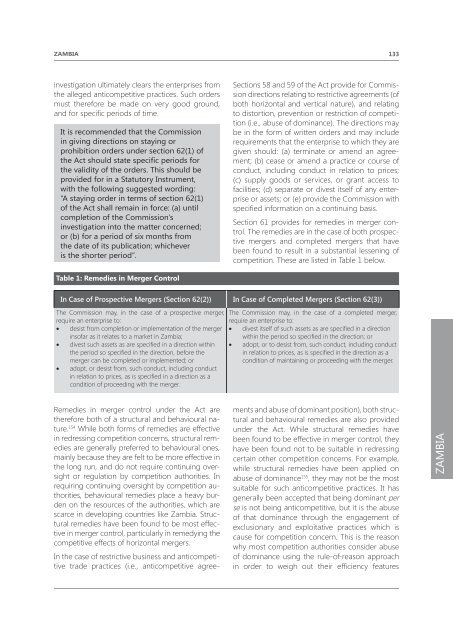a tripartite report - Unctad
a tripartite report - Unctad
a tripartite report - Unctad
You also want an ePaper? Increase the reach of your titles
YUMPU automatically turns print PDFs into web optimized ePapers that Google loves.
ZAMBIA<br />
investigation ultimately clears the enterprises from<br />
the alleged anticompetitive practices. Such orders<br />
must therefore be made on very good ground,<br />
<br />
It is recommended that the Commission<br />
in giving directions on staying or<br />
prohibition orders under section 62(1) of<br />
<br />
the validity of the orders. This should be<br />
provided for in a Statutory Instrument,<br />
with the following suggested wording:<br />
“A staying order in terms of section 62(1)<br />
of the Act shall remain in force: (a) until<br />
completion of the Commission’s<br />
investigation into the matter concerned;<br />
or (b) for a period of six months from<br />
the date of its publication; whichever<br />
is the shorter period”.<br />
Table 1: Remedies in Merger Control<br />
In Case of Prospective Mergers (Section 62(2)) In Case of Completed Mergers (Section 62(3))<br />
The Commission may, in the case of a prospective merger,<br />
require an enterprise to:<br />
• desist from completion or implementation of the merger<br />
insofar as it relates to a market in Zambia;<br />
• <br />
<br />
merger can be completed or implemented; or<br />
• adopt, or desist from, such conduct, including conduct<br />
<br />
condition of proceeding with the merger.<br />
Remedies in merger control under the Act are<br />
therefore both of a structural and behavioural nature.<br />
154 While both forms of remedies are effective<br />
in redressing competition concerns, structural remedies<br />
are generally preferred to behavioural ones,<br />
mainly because they are felt to be more effective in<br />
the long run, and do not require continuing oversight<br />
or regulation by competition authorities. In<br />
requiring continuing oversight by competition authorities,<br />
behavioural remedies place a heavy burden<br />
on the resources of the authorities, which are<br />
scarce in developing countries like Zambia. Structural<br />
remedies have been found to be most effective<br />
in merger control, particularly in remedying the<br />
competitive effects of horizontal mergers.<br />
In the case of restrictive business and anticompetitive<br />
trade practices (i.e., anticompetitive agree-<br />
133<br />
Sections 58 and 59 of the Act provide for Commission<br />
directions relating to restrictive agreements (of<br />
both horizontal and vertical nature), and relating<br />
to distortion, prevention or restriction of competition<br />
(i.e., abuse of dominance). The directions may<br />
be in the form of written orders and may include<br />
requirements that the enterprise to which they are<br />
given should: (a) terminate or amend an agreement;<br />
(b) cease or amend a practice or course of<br />
conduct, including conduct in relation to prices;<br />
(c) supply goods or services, or grant access to<br />
facilities; (d) separate or divest itself of any enterprise<br />
or assets; or (e) provide the Commission with<br />
<br />
Section 61 provides for remedies in merger control.<br />
The remedies are in the case of both prospective<br />
mergers and completed mergers that have<br />
been found to result in a substantial lessening of<br />
competition. These are listed in Table 1 below.<br />
The Commission may, in the case of a completed merger,<br />
require an enterprise to:<br />
• <br />
<br />
• adopt, or to desist from, such conduct, including conduct<br />
<br />
condition of maintaining or proceeding with the merger.<br />
ments and abuse of dominant position), both structural<br />
and behavioural remedies are also provided<br />
under the Act. While structural remedies have<br />
been found to be effective in merger control, they<br />
have been found not to be suitable in redressing<br />
certain other competition concerns. For example,<br />
while structural remedies have been applied on<br />
abuse of dominance 155 , they may not be the most<br />
suitable for such anticompetitive practices. It has<br />
generally been accepted that being dominant per<br />
se is not being anticompetitive, but it is the abuse<br />
of that dominance through the engagement of<br />
exclusionary and exploitative practices which is<br />
cause for competition concern. This is the reason<br />
why most competition authorities consider abuse<br />
of dominance using the rule-of-reason approach<br />
<br />
ZAMBIA

















